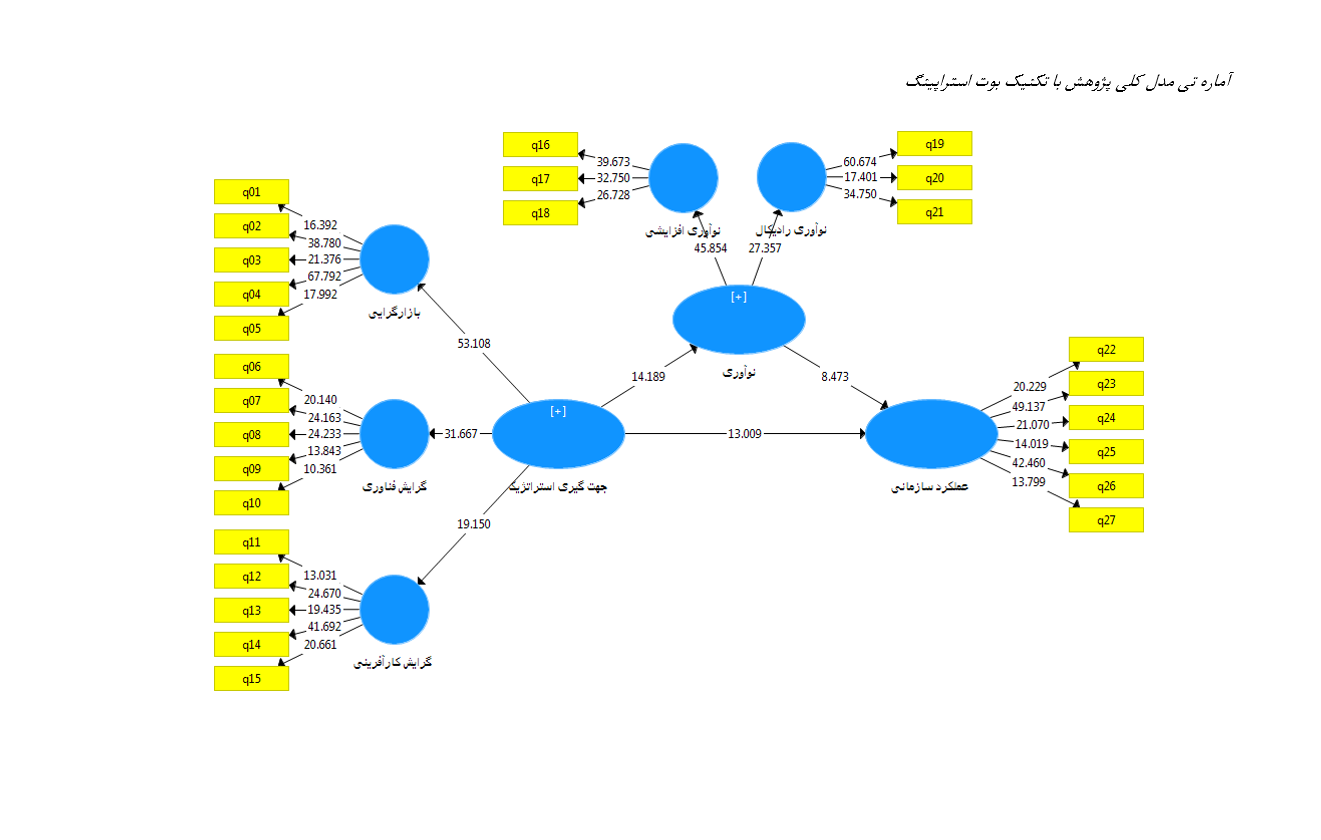تاثیر جهت گیری استراتژیک کسب و کار بر عملکرد سازمانی با نقش میانجی نوآوری
کلمات کلیدی:
جهت گیری استراتژیک, عملکرد سازمانی, نوآوری سازمانیچکیده
تغییرات جهانی، تحولات مدیریت استراتژیک و ضرورت گذار از جهت گیریهای برنامه ریز به جهت گیریهای فرهنگی به منظور بهبود مثبت عملکرد سازمانها، امری الزامی بودهاست. جهت گیریهای استراتژیک، اصول راهبری هستند که بر برنامهها و فعالیتهای استراتژیک سازمان تأثیر میگذارند و در واقع موفقیت سازمانی، عموماً به جهت گیری استراتژیک نسبت داده میشود. جهت گیری استراتژیک، تلاش سازمانها برای ایجاد رفتارهای سازمانی، متناسب با استراتژیهای مدیران است. هدف این تحقیق بررسی جهت گیری استراتژیک و عملکرد سازمانی با توجه به نقش میانجی نوآوری بودهاست. جامعه آماری این تحقیق را 1200 نفر از کارکنان و مدیران شرکت اتوبوسرانی بر اساس فرمول تشکیل داده است، 291 نفر به عنوان نمونه در نظر گرفته شدهاست. در نهایت 285 پرسشنامه جهت تحلیل گردآوری شدهاست. ابزارگردآوری دادهها در این تحقیق پرسشنامه بودهاست. فرضیههای تحقیق با استفاده از نرم افزار smart.PLS مورد آزمون قرار گرفت. نتایج نشان داد که جهت گیری استراتژیک به طور قابل توجهی بر عملکرد سازمانی تأثیر میگذارد. جهت گیری استراتژیک به طور قابل توجهی بر نوآوری تأثیر میگذارد. نوآوری به طور قابل توجهی بر عملکرد سازمانی تأثیر میگذارد. نوآوری یک اثر میانجی بر پیوند جهت گیری استراتژیک و عملکرد سازمانی دارد.
دانلودها
مراجع
Abdulrab, M., Al-Mamary, Y. H. S., Alwaheeb, M. A., Alshammari, N. G. M., Balhareth, H., & Al-Shammari, S. A.
(2021). Mediating role of strategic orientations in the relationship between entrepreneurial orientation and
performance of Saudi SMEs. Brazilian Journal of Operations & Production Management, 18(4).
https://doi.org/10.14488/BJOPM.2021.029
Adiguzel, Z., & Sonmez Cakir, F. (2022). Examining the effects of strategic orientation and motivation on performance
and innovation in the production sector of automobile spare parts. European Journal of Management Studies, 27(2),
-148. https://doi.org/10.1108/EJMS-01-2022-0007
Akter, S., Hossain, M. A., Lu, Q., & Shams, S. M. R. (2021). Big data-driven strategic orientation in international
marketing. International Marketing Review, 38(5), 927-947. https://doi.org/10.1108/IMR-11-2020-0256
Appiah, M. K., Akolaa, R. A., & Ayisi-Addo, A. K. (2022). Modeling the impact of macroenvironmental forces on
investment in renewable energy technologies in Ghana: The moderating role of Entrepreneurship orientation
dimensions. Cogent Economics & Finance, 10(1). https://doi.org/10.1080/23322039.2022.2071387
Asghari, A. F., & Amani, R. (2016). Surveying the influence of market and innovation orientation on E-Loyalty (Case
Study: An Iranian Company). Journal of Administrative Management, Education + Training, 12(4), 43-50.
https://www.sid.ir/paper/521239/en
Blaique, L., Abu-Salim, T., Asad Mir, F., & Omahony, B. (2022). The impact of social and organisational capital on
service innovation capability during COVID-19: The mediating role of strategic environmental scanning. European
Journal of Innovation Management. https://doi.org/10.1108/EJIM-01-2022-0023
Cao, T. T., Le, P. B., & Nguyen, N. T. M. (2022). Impacts of high-involvement HRM practices on organizational
innovation capability: The mediating mechanism of tacit and explicit knowledge sharing. International Journal of
Innovation Science, 14(5), 733-749. https://doi.org/10.1108/IJIS-05-2021-0091
Capriati, M., & Divella, M. (2020). Firms' organisational capabilities and innovation generation: The case of Italy.
Economics of Innovation & New Technology, 31(6), 447-466. https://doi.org/10.1080/10438599.2020.1823674
Charoensukmongkol, P. (2016). The interconnections between bribery, political network, government supports, and their
consequences on export performance of small and medium enterprises in Thailand. Journal of International
Entrepreneurship, 14(2), 259-276. https://doi.org/10.1007/s10843-016-0164-1
Charoensukmongkol, P. (2022). Does entrepreneurs' improvisational behavior improve firm performance in time of
crisis? Management Research Review, 45(1), 26-46. https://doi.org/10.1108/MRR-12-2020-0738
Fan, F., Zhang, X., & Wang, X. (2022). Are there political cycles hidden inside collaborative innovation efficiency? An
empirical study based on Chinese cities. Science & Public Policy, 49(3), 532-551.
https://doi.org/10.1093/scipol/scac005
Huo, M., & Li, C. (2022). Impact of managerial power on enterprise innovation performance: The mediating roles of
financing constraints and strategic orientation. Chinese Management Studies, 17(3), 637-659.
https://doi.org/10.1108/CMS-06-2021-0249
Ibarra-Cisneros, M. A., Demuner-Flores, M. D. R., & Hernández-Perlines, F. (2021). Strategic orientations, firm
performance and the moderating effect of absorptive capacity. Journal of Strategy and Management, 14(4), 582-
https://doi.org/10.1108/JSMA-05-2020-0121
Iqbal, S., Rasheed, M., Khan, H., & Siddiqi, A. (2021). Human resource practices and organizational innovation
capability: Role of knowledge management. VINE Journal of Information and Knowledge Management Systems,
(5), 732-748. https://doi.org/10.1108/VJIKMS-02-2020-0033
Jassmy, K., Banacu, C., & Bhaya, Z. (2018). Strategic orientation for improving financial performance case study in AlQadissiya governorate banking. Management and Economics Review, 2(1), 147-164.
https://www.tandfonline.com/doi/full/10.1080/23311975.2023.2211366
Kumar, K., Boesso, G., Favotto, F., & Menini, A. (2012). Strategic Orientation, Innovation Patterns and Performances
of SMEs and Large Companies. Journal of Small Business and Enterprise Development, 19, 132-145.
https://doi.org/10.1108/14626001211196442
Liu, G., Liu, W., & Ko, W. W. (2022). Organisational capabilities and small and medium sized firms' attainment of
innovation outcomes: The moderating roles of exports and formal business networks. International Journal of
Operations & Production Management, 42(7), 1022-1060. https://doi.org/10.1108/IJOPM-09-2021-0600
Maclean, M., Appiah, M. K., & Addo, J. F. (2023). Implications of strategic orientation on firms' performance in a lower
middle-income country: Does organizational innovation capability matter? Cogent Business & Management.
https://doi.org/10.1080/23311975.2023.2211366
Magalhães-Teixeira, A. M., Roldán, J. L., & Leal Millán, A. G. (2024). Strategic-hybrid orientations and perceived
business performance in medium/high-tech SMEs. European Business Review. https://doi.org/10.1108/EBR-09-
-0272
Obeidat, B., Al-Suradi, M., Masa'deh, R., & Tarhini, A. (2016). The Impact of Knowledge Management on Innovation:
An Empirical Study on Jordanian Consultancy Firms. Management Research Review, 39, 1214-1238.
https://doi.org/10.1108/MRR-09-2015-0214
Valos, M. J., & Bednall, D. H. (2010). The Alignment of Market Research with Business Strategy and CRM. Journal of
Strategic Marketing, 18, 187-199. https://doi.org/10.1080/09652540903537022
Zehir, C., Can, E., & Karaboga, T. (2015). Linking Entrepreneurial Orientation to Firm Performance: The Role of
Differentiation Strategy and Innovation Performance. Procedia-Social and Behavioral Sciences, 210, 358-367.












